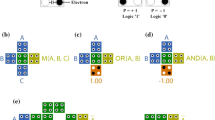Abstract
Adiabatic quantum programming defines the time-dependent mapping of a quantum algorithm into an underlying hardware or logical fabric. An essential step is embedding problem-specific information into the quantum logical fabric. We present algorithms for embedding arbitrary instances of the adiabatic quantum optimization algorithm into a square lattice of specialized unit cells. These methods extend with fabric growth while scaling linearly in time and quadratically in footprint. We also provide methods for handling hard faults in the logical fabric without invoking approximations to the original problem and illustrate their versatility through numerical studies of embeddability versus fault rates in square lattices of complete bipartite unit cells. The studies show that these algorithms are more resilient to faulty fabrics than naive embedding approaches, a feature which should prove useful in benchmarking the adiabatic quantum optimization algorithm on existing faulty hardware.










Similar content being viewed by others
References
Adler, I., et al.: Faster parameterized algorithms for minor containment. Theor. Comput. Sci. 412, 7018–7028 (2011)
Altshuler, B., Karvi, H., Roland, J.: Anderson localization makes adiabatic quantum optimization fail. Proc. Natl. Acad. Sci. USA 108, E19–E20 (2011)
Amir, E.: Approximation algorithms for treewidth. Algorithmica 56, 448–479 (2010)
Bian, Z., Chudak, F., Macready, W.G., Clark, L., Gaitan, F.: Experimental determination of Ramsey numbers. Phys. Rev. Lett. 111, 130505 (2013)
Bodlaender, H.L.: A tourist guide through treewidth. Acta Cybern. 11, 1–23 (1993)
Bodlaender, H.L.: A linear-time algorithm for finding tree decompositions of small treewidth. SIAM J. Comput. 25, 1035–1317 (1996)
Bodlaender, H.L., Koster, A.M.C.A.: Treewidth Computations II. Lower Bounds, Technical Report UU-CS-2010-022. Department of Information and Computing Sciences, Utrecht University (2010)
Boros, E., Hammer, P.L.: Pseudo-boolean optimization. Discret. Appl. Math. 123, 155–225 (2002)
Choi, V.: Minor-embedding in adiabatic quantum computation: I. The parameter setting problem. Quantum Inf. Process. 7, 193–209 (2008)
Choi, V.: Minor-embedding in adiabatic quantum computation: II. Minor-universal graph design. Quantum Inf. Process. 10, 343–353 (2011)
Dickson, N.G., Amin, M.H.S.: Does adiabatic quantum optimization fail for NP-complete problems? Phys. Rev. Lett. 106, 050502 (2011)
Dickson, N.G., Amin, M.H.S.: Algorithmic approach to adiabatic quantum optimization. Phys. Rev. A 85, 032303 (2012)
Diestel, R.: Graph Theory. Springer, Heidelberg (2005)
D-Wave Systems Inc., 100–4401 Still Creek Drive, Burnaby V5C 6G9, BC, Canada. http://www.dwavesys.com/
Farhi, E., Goldstone, J., Gutmann, S., Sipser, M.: Quantum computation by adiabatic evolution, arxiv:quant-ph/0001106 (2000)
Farhi, E., et al.: A quantum adiabatic evolution algorithm applied to random instances of an NP-complete problem. Science 292, 472–476 (2001)
Fomin, F.V., Thilikos, D.M.: Dominating sets and local treewidth. LNCS 2832, 221–229 (2003)
Gaitan, F., Clark, L.: Ramsey numbers and adiabatic quantum computing. Phys. Rev. Lett. 108, 010501 (2012)
Harris, R., et al.: Experimental investigation of an eight qubit unit cell in a superconducting optimization processor. Phys. Rev. B 82, 024511–024526 (2010)
Kleinberg, J., Rubinfeld, R.: Short paths in expander graphs. In: Proceedings of the 37th Annual Symposium on Foundations of Computer Science, pp. 86–95 (1996)
Neven, H., Rose, G., Macready, W.G.: Image recognition with an adiabatic quantum computer I. Mapping to quadratic unconstrained binary optimization, arXiv:0804.4457v1 [quant-ph] (2008)
Perdomo-Ortiz, A., Dickson, N., Drew-Brook, M., Rose, G., Aspuru-Guzik, A.: Finding low-energy conformations of lattice protein models by quantum annealing. Sci. Rep. 2, 571 (2012)
Pudenz, K.L., Lidar, D.A.: Quantum adiabatic machine learning. Quantum Inf. Process. 12, 2027–2070 (2012)
Robertson, N., Seymour, P.D.: Graph minors. XIII: the disjoint paths problem. J. Comb. Theory Ser. B 63, 65–110 (1995)
Xiong, L., Dinneen, M.J.: The Feasibility and Use of a Minor Containment Algorithm, Computer Science Technical Reports 171, University of Auckland (2000)
Acknowledgments
This work was supported by the Lockheed Martin Corporation under Contract No. NFE-11-03394. The authors thank Greg Tallant (Lockheed) for technical interchange and Daniel Pack (ORNL) for help preparing Fig. 2. This manuscript has been authored by a contractor of the U.S. Government under Contract No. DE-AC05-00OR22725. Accordingly, the U.S. Government retains a non-exclusive, royalty-free license to publish or reproduce the published form of this contribution, or allow others to do so, for U.S. Government purposes.
Author information
Authors and Affiliations
Corresponding author
Rights and permissions
About this article
Cite this article
Klymko, C., Sullivan, B.D. & Humble, T.S. Adiabatic quantum programming: minor embedding with hard faults. Quantum Inf Process 13, 709–729 (2014). https://doi.org/10.1007/s11128-013-0683-9
Received:
Accepted:
Published:
Issue Date:
DOI: https://doi.org/10.1007/s11128-013-0683-9




